New website on the way! Bear with!
Tuesday, 10 August 2021Update! My new website is up and running at louisgreenberg.com
I'm working on some exciting new changes at the moment, including brushing up my web and user experience design skills, along with a new-look website that's been delayed during my last twelve years of intense wordwork. Watch this space! (Or, preferably, avert your eyes until it's done.)
Exposure: Coming in November 2021
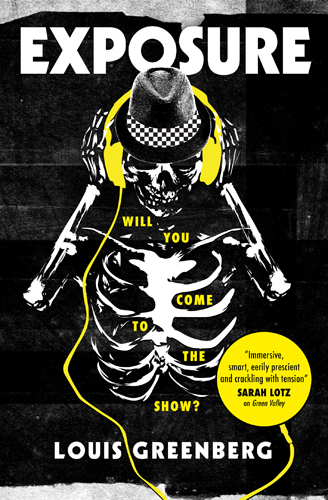 My new novel, Exposure, is coming in November 2021! My second novel for the brilliant Titan Books, Exposure is a novel about creepy immersive theatre, love, family, music and belonging ... and maybe vengeful ghosts:
My new novel, Exposure, is coming in November 2021! My second novel for the brilliant Titan Books, Exposure is a novel about creepy immersive theatre, love, family, music and belonging ... and maybe vengeful ghosts:
In a Britain akin to this one, Vincent Rice falls off a ladder, literally at Petra Orff’s feet. They introduce themselves, and he offers to take her to Metamuse, an alternative theatre experience like no other that he won tickets to in a competition he doesn’t remember entering.
Vincent has a complex sense of home and immigrant Petra senses a kindred spirit in him. As time goes on, inexplicable occurrences pile on top of one another, connected to Metamuse: certainly more than just a theatre experience. Unquiet dead seem to be reaching into the world to protest injustices both past and present.
You can pre-order Exposure from all your favourite book retailers.
Oxford Narrative Futures podcast (with writing exercises by me)
I've been involved with Narrative Futures, an interactive podcast created by Chelsea Haith of The Oxford University Research Centre for the Humanities (TORCH), featuring interviews with leading authors and editors in the speculative genre and writing prompts designed to support the imagination of better futures.
Narrative Futures is the capstone podcast project of the Futures Thinking network at TORCH. Devised, recorded and edited by Chelsea Haith, the Narrative Futures podcast features eight interviews with some of the most important authors and editors working in the the speculative genre today. At the end of each interview, novelist and creative writing tutor Louis Greenberg presents two writing prompts which are designed to support engaged thought and creative imagination about the interview and the listener's own creative practice in narrative building.
Interviewed on the podcast are Lauren Beukes, Mohale Mashigo, Sami Shah, Mahvesh Murad, Jared Shurin, EJ Swift, Ken Liu, and Tade Thompson. Each interview explores writing strategies, hopes and fears for the future, opinions on genre fiction and tackles questions such as: How do you conceive of and write time? Why is alien invasion a good metaphor for colonialism? What would a benevolent AI look like? What kind of representation is needed in the speculative genre? Are the old stories of future worlds still relevant? How do we integrate the present pandemic into our future imaginaries?
Narrative Futures airs its first weekly episode on 15 October 2020. Listen and subscribe to it for free here: http://podcasts.ox.ac.uk/series/narrative-futures
Watch the Narrative Futures trailer in the frame above, or here: https://podcasts.ox.ac.uk/narrative-futures-coming-soon
Three new Book Dash books published!
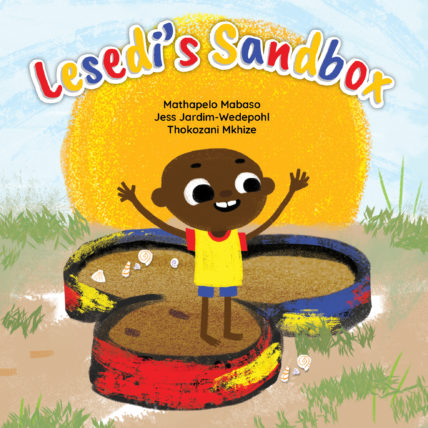 During lockdown in April 2020, I took part in the first-ever Virtual Book Dash as the team editor. I lurked pedantically as writers Mathapelo Mabaso, Refiloe Moahloli and Sam Wilson; illustrators Jess Jardim-Wedepohl, Subi Bosa and Thea Nicole de Klerk; and designers Chenél Ferreira, Natalie Pierre-Eugene and Thokozane Mkhize created three brand-new free African children's stories under the brilliant guidance of the Book Dash team.
During lockdown in April 2020, I took part in the first-ever Virtual Book Dash as the team editor. I lurked pedantically as writers Mathapelo Mabaso, Refiloe Moahloli and Sam Wilson; illustrators Jess Jardim-Wedepohl, Subi Bosa and Thea Nicole de Klerk; and designers Chenél Ferreira, Natalie Pierre-Eugene and Thokozane Mkhize created three brand-new free African children's stories under the brilliant guidance of the Book Dash team.
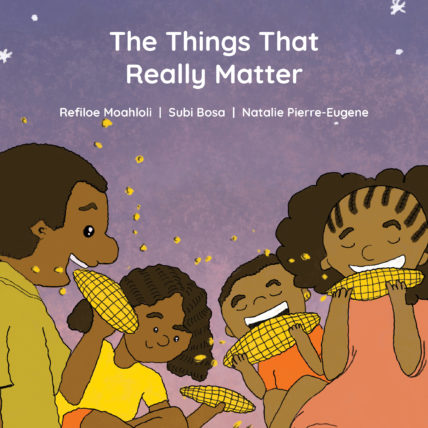 The results of Book Dash 15 are now published: read, download and share The Things that Really Matter, Where's that Cat and Lesedi's Sandbox.
The results of Book Dash 15 are now published: read, download and share The Things that Really Matter, Where's that Cat and Lesedi's Sandbox.
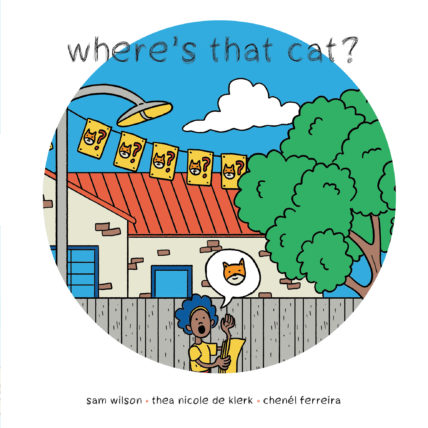 Book Dash is determined to get high-quality African children's books into every child's home, in South Africa and beyond. Teams of volunteer writers, illustrators, designers and editors have so far got together to produce over a hundred children's books that are free to download, distribute and print.
Book Dash is determined to get high-quality African children's books into every child's home, in South Africa and beyond. Teams of volunteer writers, illustrators, designers and editors have so far got together to produce over a hundred children's books that are free to download, distribute and print.
You can browse, read and download all the Book Dash books, read more and support Book Dash's work here.
Read along with Rafiki's Style on video
To help children get books where they are, I read Rafiki's Style on video for Book Dash. Rafiki's Style is a Book Dash children's book written by me, illustrated by Audrey Anderson and designed by Wesley Thompson.
Book Dash is determined to get high-quality African children's books into every child's home, in South Africa and beyond. Teams of volunteer writers, illustrators, designers and editors have so far got together to produce over a hundred children's books that are free to download, distribute and print.
You can browse, read and download all the Book Dash books, read more and support Book Dash's work here.
Watch the video above or click here to see it on Book Dash's YouTube channel.
Green Valley released
 Green Valley is now out! Published by the brilliant Titan Books, home of indie sci-fi and fantasy goodness, Kim Newman, Charlie Human, V.E. Schwab, Hard Case Crime, and Forbidden Planets full of comics, Green Valley was released in the US, UK and worldwide in June 2019.
Green Valley is now out! Published by the brilliant Titan Books, home of indie sci-fi and fantasy goodness, Kim Newman, Charlie Human, V.E. Schwab, Hard Case Crime, and Forbidden Planets full of comics, Green Valley was released in the US, UK and worldwide in June 2019.
When Lucie Sterling’s niece is abducted, she knows it won’t be easy to find answers. Stanton is no ordinary city: invasive digital technology has been banned, by public vote. No surveillance state, no shadowy companies holding databases of information on private citizens, no phones tracking their every move. Only one place stays firmly anchored in the bad old ways, in a huge bunker across town: Green Valley, where the inhabitants have retreated into the comfort of full-time virtual reality—personae non gratae to the outside world. And it’s inside Green Valley, beyond the ideal virtual world it presents, that Lucie will have to go to find her missing niece.
Green Valley has been listed on Barnes and Noble's selection of best SFFH for June 2019, has been tipped as a "taut technological mystery [that] keeps readers on edge to the very end” by Publishers' Weekly, and has been called "a stunning thriller ... Utterly brilliant” by The Dream Cage.Click here for the latest reviews of Green Valley.
Meet the editor: a SfEP profile
Recently, the Society for Editors and Proofreaders ran a profile of me on their website. Find out how I got trapped between the pages, some editorial bugbears, how I got into freelance editing, and about some perhaps surprising non-wordworking interests.
Why did you choose an editorial career, and how did you get into it?
I like to think I fell into it by accident, but ink is really in my blood. My mother was a teacher and journalist and my father was a news editor and journalist and together they published two local newspapers in Johannesburg. I grew up under tables as they laid out the weekly editions with scissors, glue and broadsheet. I had no plan to go into wordworking and I only realised I was helplessly trapped between pages when I started working as a bookseller. Being a buyer for a major bookshop was an excellent introduction to the publishers who later hired me as a freelancer. I started by moonlighting for Random House South Africa, building their website, then assessing manuscripts, then proofreading and editing.
What training have you done to get your editorial career up and running?
I did most of my training on the job, with ten years' worth of freelance jobs for repeat publishing clients, consolidating my knowledge with workshops and forum discussions of the Professional Editors' Guild. When I came to the UK and joined SfEP, I took the SfEP level 2 courses in copyediting and proofreading to calibrate and formalise my skills.
What work are you most proud of?
Download my short story, “Akhenaten Goes to Paris”, here
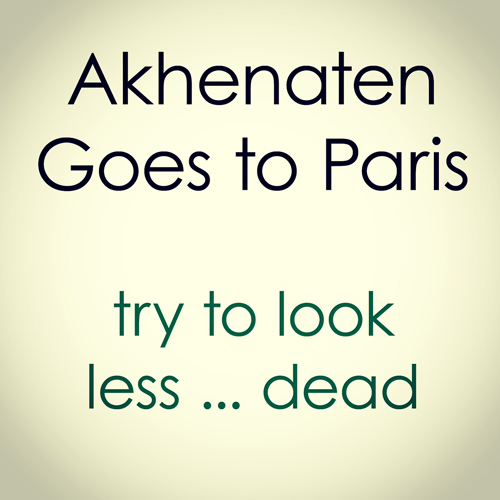 Following the success of the re-release of "Oasis", my short story, “Akhenaten Goes to Paris”, is now available to download – free of charge and fiddly bits. Just click here to download the PDF.
Following the success of the re-release of "Oasis", my short story, “Akhenaten Goes to Paris”, is now available to download – free of charge and fiddly bits. Just click here to download the PDF.
“Akhenaten Goes to Paris” was first published in Jurassic London's brilliant collection of new mummy stories, The Book of the Dead, edited by Jared Shurin and is republished with his very kind permission.
Ancient mummy Akhenaten has an important message for his father. To pass it on, he needs to navigate not only French border control, but the seductions and the politics of modern-day Paris.
"I was particularly tickled by the long-lost mummy of Akhenaten trying to get through French passport control after putting on a wig and a body stocking and slathering his face with bees wax `to look less….dead’." - Fantasy Reads
"A signature piece [featuring] a gleefully macabre cabal of mummies" - Nerine Dorman, This is My World
"I just adored Louis Greenberg’s Akhenaten Goes to Paris" - A Fantastical Librarian
"By far the funniest of the whole bunch" - Niall Alexander, Tor.com
"Nicely done." - This is How She Fight Start
This edition comes with bonus content of a talk I gave about the story and its psycho-social background to the Monstrous Antiquities conference at the University College London.
I hope you like it. Let me know what you think.
Titan Books to publish Green Valley
 I'm very happy to share the news that my new
novel, Green Valley, has an English-language publisher.
I'm very happy to share the news that my new
novel, Green Valley, has an English-language publisher.
Titan Books, the home of indie sci-fi and fantasy goodness, Kim Newman, Charlie Human, V.E. Schwab, Hard Case Crime, and Forbidden Planets full of comics, will be publishing Green Valley in the US, UK and worldwide in June 2019.
When Lucie Sterling’s niece is abducted, she knows it won’t be easy to find answers. Stanton is no ordinary city: invasive digital technology has been banned, by public vote. No surveillance state, no shadowy companies holding databases of information on private citizens, no phones tracking their every move. Only one place stays firmly anchored in the bad old ways, in a huge bunker across town: Green Valley, where the inhabitants have retreated into the comfort of full-time virtual reality—personae non gratae to the outside world. And it’s inside Green Valley, beyond the ideal virtual world it presents, that Lucie will have to go to find her missing niece.
Watch this space for more news.
A guest blog on copyediting
In 2018, I copyedited Martin Edwards' latest novel, Gallows Court, for Head of Zeus. It's a high-octane thriller set in the chilly London winter of 1930. I met Martin in person at a Society of Authors event alongside the Harrogate Crime Festival last month, and he invited me to write a guest blog for his site. Here I talk about some of the things I've stickled over and the nits I've picked during my time editing crime fiction.
Martin Edwards is the chair of the Crime Writers' Association and the president of the Detection Club, so it was no surprise that my main challenge with Gallows Court was finding something to correct!
When Head of Zeus asked me to copyedit Martin Edwards’ Gallows Court, I jumped at the chance. It’s an enticing mystery set in 1930 London and I felt transported into the fog and freeze of that dark winter and the intricate and compelling murder plot that plays out there. But at the same time, I suspected that it would be a challenge – to find something to correct.
Copyediting is a fine-tooth, stickling business, a different mental process from the creative splurge of drafting fresh fiction. Even writers who can edit will struggle to inhabit both headspaces on the same project. As an author myself, I think of myself as author’s editor, sensitive to retaining the writer’s voice, wisdom and intentions. I like to treat my clients’ manuscripts with the respectful care and attention I hope will be given to my own work.
Even when copy is very clean, each book throws up its own themes:
Read on at Martin Edwards' blog.
Download my short story, “Oasis”, here
My short story, “Oasis”, is now available to download – free of charge and fiddly bits. Just click here to download the PDF.
“Oasis” was first published in the Short Story Day anthology Water: New Short Fiction from Africa, edited by Nick Mulgrew and Karina Szczurek and it's one I especially enjoyed writing.
Set in a near-future when water is sold for profit, “Oasis” charts the first, quiet step in an epic journey. Jame, a child with remarkable abilities, is being smuggled out of Europe to join a revolution in Mali. The story is narrated by the reluctant guardian who’s helping Jame on through security in the Geneva airport.
The story is told with non-gendered pronouns that I adapted from Michael Spivak's scheme developed on LambdaMOO. I found it fascinating to realise just how much gender is hardwired into the English language.
I hope you like it. Let me know what you think.
My new novel sold in Germany
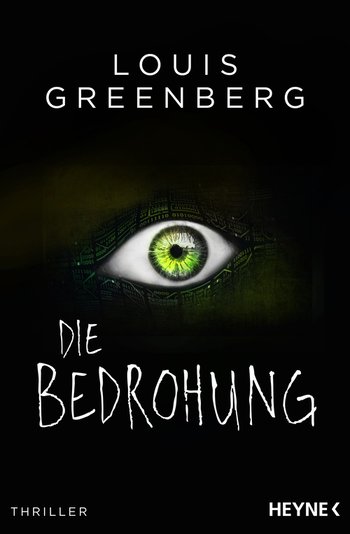 My new novel, Green Valley, a post-cyber noir about truth and fakery, will be published in German by the marvellous team at Heyne Verlag. Heyne has done an enthusiastic and committed job with S.L. Grey's recent novels in Germany, sending both to the Spiegel bestseller lists, and I'm excited and delighted to have my solo novel in their excellent hands.
My new novel, Green Valley, a post-cyber noir about truth and fakery, will be published in German by the marvellous team at Heyne Verlag. Heyne has done an enthusiastic and committed job with S.L. Grey's recent novels in Germany, sending both to the Spiegel bestseller lists, and I'm excited and delighted to have my solo novel in their excellent hands.
Green Valley will be published in German as Die Bedrohung in November 2018. I'll keep you updated about any other news, including when you'll get to see the original English edition.
Green Valley is set in a near-future when the world has turned against the abuses of the internet economy; citizens and the state have zealously re-embraced analogue technology and apparently prize privacy above all. On the edges of the city of Stanton lies Green Valley, the remnants of Zeroth Corporation, a global digital corporation now holed up mysteriously within a concrete shell. A trickle of dead children, officially invisible to Stanton law enforcement, has been emerging from the enclave, and it's only Lucie Sterling, an anti-surveillance operative for Stanton Police who years ago left her infant daughter Kira with her ex-husband David in Zeroth's precinct, who starts taking notice. When David asks for her help to find Kira, who's gone missing in the enclave, Lucie is offered the rare chance to go inside Green Valley and experience its virtual environment. It's the break her covert unit's been waiting for, but she soon realises there's a devastating truth behind Green Valley's veneer.
Watch this space for more!
Audio recordings from the Franschhoek Literary Festival 2016
Earlier this month, I attended the Franschhoek Literary Festival, and appeared on three of the scores of panel events. You can now find audio recordings of over sixty of the panel discussions on the festival's audio archive, a trove for anyone who didn't make it, or for people who want to catch alternative panels, or who want to relive the ones they attended. (Two of my panels are in the archive, numbers 89 and 99.)
Click here to access the Franschoek Literary Festival 2016 audio archive.
In addition, you can listen to Amabookabooka's special Friday the 13th live improv session at the Franschhoek Literary Festival, What was that? To hear Fred Strydom, Lauren Beukes and me embarrassing ourselves, click on...
Major US publishing deal for The Apartment
Wednesday, 24 February 2016Good news for American readers! Blumhouse Books will be publishing The Apartment this October! Blumhouse Books is an imprint of Anchor Books run by Jason Blum, producer of Paranormal Activity, Insidious and other modern horror classics. Anchor's part of the Knopf Doubleday / Penguin Random House Group, so the book is in excellent and horrible good hands and will be widely available in the US and Canada. Blumhouse is our first American publisher, so we're thrilled to parts.
S.L. Grey's top 5 thrillers in unusual locations
Friday, 19 February 2016To celebrate next the paperback release of Under Ground, we told the Tor UK blog about our five top thrillers with unusual settings. They include the brilliant South African novels, Power Play by Mike Nicol and Young Blood by Sifiso Mzobe:
Power Play, Mike Nicol
South African crime king Mike Nicol has no hesitation in populating his novels with hectic characters with dubious morals and placing them in hectic and dubious locations. In his latest, Power Play, there’s an unforgettable scene in a dinghy floating in shark-infested waters off Cape Point. Nicol’s use of recognisably real and fascinating locations combined with scandalous action makes you believe that the skulduggery in his novels can and does take place in reality.
Young Blood, Sifiso Mzobe
Young Blood’s setting – Umlazi Township in Durban – isn’t unusual for us as we’re from South Africa, but it’s a good excuse for us to give a shout out for a novel that deserves to be more widely read. Exploring the ins and outs of the stolen car trade, it deservedly won the Sunday Times fiction prize, SA’s top literary honour, and cemented Mzobe’s position as not only an author to watch, but the go-to guy for any writers needing research info on the ins and outs of car theft.
Click here to read on for the full list.
My short story, "Oasis", in the Short Story Day Africa anthology, Water
 Writing my genderless short story, "Oasis", for the Short Story Day Africa Water competition was fascinating experiment. For one thing, it showed me just how gender is semantically hardwired into our language.
Writing my genderless short story, "Oasis", for the Short Story Day Africa Water competition was fascinating experiment. For one thing, it showed me just how gender is semantically hardwired into our language.
In the end, I developed a modified Spivak system of pronouns. The Spivak system was invented not, as you might expect, by the literary theorist Gayatri Spivak, but by mathematician Michael Spivak on the LambdaMOO role-playing game in the early days of the internet (on which I was guilty of spending way too much time (and being banned from the Wits computer room for using up all of the History department's bandwidth). But that's a story for another time... at least I have something to show for myself, two decades later.)
"Oasis" is about a teenager being escorted out of Europe to join the rebellion against corporate water supply. The Water anthology is now out, with an amazing line-up of African writers. Check it out: http://shortstorydayafrica.org/books/ It's launching in Cape Town in March.
Rafiki's Style
Back in June 2015, I blogged about my Book Dash experience, and I'm very proud to present the finished book I created with ace illustrator Audrey Anderson and crack designer Wesley Thompson:
Rafiki’s style is all his own, but when the Cool Cat Crew struts by, he starts to wonder if it’s good enough.
Created at Book Dash Johannesburg on 27 July 2015 by Audrey Anderson (illustrator), Louis Greenberg (writer) and Wesley Thompson (designer).
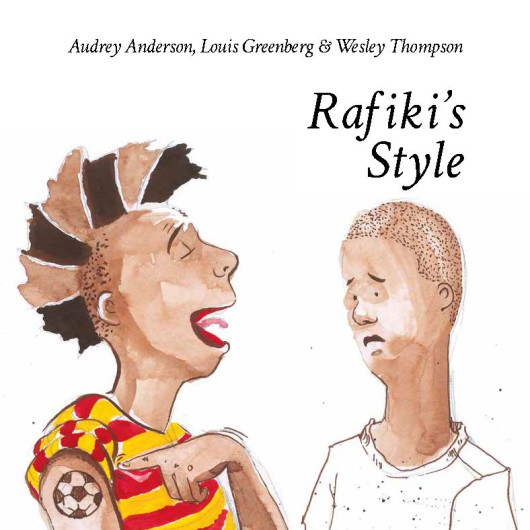
You can read, download and print this Book Dash book for free here. Also check out many other brilliant titles by illustrators, writers, and designers throughout South Africa.
Louis longlisted for Short Story Day Africa prize
Wednesday, 2 September 2015Louis was very pleased to hear that his entry to the Short Story Day Africa prize has been longlisted with twenty other stories from a large field of entries from all across the continent. The theme of this year's story is Water, and as it's currently under blind judging, he can't say any more!
The shortlisted stories will be announced in October and the winner in November. Read more about the competition here.
Get to know S.L. Grey
Thursday, 16 July 2015 Under Ground is published today in the United Kingdom and will be reaching the Commonwealth soon. Editions in Dutch, German, French, Spanish and Korean are also being prepared. Pan Macmillan, our new English publishers, interviewed us to get to introduce us to our readers new and old, asking abour our favourite and formative books and characters. You can tell a lot by what people keep on their bookshelves!
Under Ground is published today in the United Kingdom and will be reaching the Commonwealth soon. Editions in Dutch, German, French, Spanish and Korean are also being prepared. Pan Macmillan, our new English publishers, interviewed us to get to introduce us to our readers new and old, asking abour our favourite and formative books and characters. You can tell a lot by what people keep on their bookshelves!
Tell us your top five crime and thriller novels of all time?
Louis: If I have to choose just five, I’d go for:
- The Secret History by Donna Tartt: I was a self-absorbed student at the time; these smart and nasty characters were aspirational to me.
- Killer Country by Mike Nicol: Nicol is my favourite writer of noir crime. He gets to the root of South Africa’s ills with a perfect ear and incomparable styling. You come out of the book thinking in the rhythms of the characters.
- City of Glass from The New York Trilogy by Paul Auster, because our drive to solve mysteries is a psychological desire for impossible completion. (I might sneak The City & The City and The Wind-Up Bird Chronicle into this line.)
- Enigma by Robert Harris: Harris has a unique ability to present meticulously researched historical settings and events in riveting, page-turning plots. You run with the characters and stories and feel like you’re learning something at the same time.
- Under the Skin by Michel Faber: the best example of creeping dread. Not much happens and the space and the silence are terrifying. Jonathan Glazer’s film version was an excellent adaptation of the spirit of the novel.
Sarah: Painful to choose just five, but here goes:
- Black Heart by Mike Nicol. The third in Mike Nicol’s Revenge Trilogy, (Louis’s choice, Killer Country, is the second). Heartily agree with Louis’s comments about Nicol’s noirish stylishness, plus he’s the king of killer dialogue.
- Freedomland by Richard Price. I’ve read this about twenty times. A master-class in dialogue and atmosphere, it skewers lazy preconceptions about race.
- The Cutting Room byLouise Welsh. This unputdownable and stylish thriller is laced with delicious black humour, and has a vicious yet sympathetic protagonist.
- Little Children by Tom Perotta. Like Price, Perotta scalpels straight through the heart of American society, and is fearless when it comes to so-called difficult subjects (in this case, paedophilia). He’s also witty as hell.
- Joyland by Stephen King. If there is such a thing as a flawless novel, this is it. Full of heart, and the ending made me sob.
What’s the first book you remember falling in love with?
Louis: Johnny Lion’s Book by Edith Thatcher Hurd. It's about a lonely little lion who gets carried away into an imaginative adventure by a book. I am Johnny; stories still spice up my ordinary life.
Sarah: The Weirdstone of Brisingamen by Alan Garner. I can still remember staying up all night to finish it.
Which book do you wish you had written and why?
Read on for the full interview...
As always, check here for a list of our latest reviews and interviews.
"Somewhere in the world, there's always an S.L. Grey novel being written"
Friday, 10 July 2015Pan Macmillan recently asked Louis about the collaborative process between him and Sarah Lotz, and how they met.
Sarah and I met online at bookslive.co.za, which at the time was not only the internet newspaper about South African books, but also a forum where writers could chat, joke and commiserate together. The social functions of the site have been taken over by Facebook and Twitter since, but the site was important in introducing several writers to one another and allowing us to work together.
In 2009, I commissioned a collection of short stories, Home Away, from authors I only could have known through BooksLive, and Sarah was among them. She wrote a zombie story set in Botswana. Later that year, my family and I went on holiday to Cape Town, and Sarah hosted a party at her house, which is when I first met her in person.
A few months later, Sarah came up to Johannesburg for a crime fiction seminar at the University of Witwatersrand, where I was studying for my doctorate.
Read on for the full article...
A thorough interview with S.L. Grey
Thursday, 9 July 2015Top UK independent horror review site, The Ginger Nuts of Horror, recently engaged us in a wide-ranging interview that covered all three of the Downside novels as well as our new one, Under Ground. Here's an extract:
Hello, how are things with the pair of you?
L: Fine, thanks. Between us, we usually average out; while one of us is having a crisis of some sort, the other’s calm and happy. Sarah’s in summery Shropshire and I’m in wintery Johannesburg, so we tend to meet in the moderate middle.
For those who don’t know who is S.L. Grey, and why did you chose Grey as your ‘surname”
L: We are Sarah Lotz, a novelist and scriptwriter who’s divided her time between the UK and Cape Town, South Africa, and Louis Greenberg, a novelist and editor born, bred and based in Johannesburg.
As I remember it, we wanted a simple and neutral sounding name for our collaborative persona. It helps that Greys are certain breed of hermetic Downsiders in The Mall particularly, and that the mannequins on our first-ever book jacket were grey. We like the idea of blending into the background and pulling the strings from behind the scenes.
How did the pair of you come to work together?
L: In mid-2009, Sarah came up to Johannesburg to speak at a crime colloquium at the university where I was finishing my doctorate. We’d been in touch before – she’d written a short story about zombies in Botswana for an anthology I’d just put together, and we’d met in Cape Town once. We bunked the afternoon session, had a few drinks in the student pub, and discussed our mutual interest in horror and decided to write a novel together. I’d just quit my day job, so I was in the position to jump straight in. By the end of the year, we’d drafted The Mall.
I’ll assume that this is a process that you both enjoy, as you are about to publish your fourth novel together?
L: Absolutely, and we’ve just finished drafting our fifth book together, due out next year. We’ve managed to keep the same, matching desire and work ethic over the last six years and we’ve retained the sense of trust and respect for each other we’ve had from the start. I think that’s quite rare, and we’re lucky.
Read on for the full interview...
The Ginger Nuts of Horror also gave Under Ground a fine review, saying "Under Ground is a brilliant modern take on the last man standing type of novel crossed with a tense Towering Inferno sense of being trapped in a burning cage. It will grab your attention from the first chapter and have you hooked right up to the perfect ending." Read the whole review here, and check here for a list of our latest reviews and interviews.
Under Ground hardbacks are printed
Tuesday, 23 June 2015... and very beautiful!
Tor UK tweeted this picture of the finished copies looking dark and creepy and resplendent with their moody endpapers. We love them!
OMG *squeals* hardback copies of UNDER GROUND by @slgreyauthor have landed! Check out those endpapers! pic.twitter.com/i9SekHXIKd
— Tor Books HQ (@UKTor) June 23, 2015
Prawn Apocalypse
Monday, 15 September 2014This story first appeared in the Sunday Times Lifestyle on 14 September 2014:
Granma Vito talks like she’s a hundred years old, but she’s only been alive for seven summers. Don’t get me wrong, that’s pretty ancient for a Parktown Prawn, but sometimes she spins her tales a little fuzzy.
‘Give me some of the sweet stuff,’ she says, her broken left mandible clutching uselessly at the air in front of her mouth.
I spear a bit of moist dog pellet from the pile and approach her, trying not to inhale her stink as I point the mush into her mouth. ‘Mmm …’ Her jaw clatters and scrapes as she guzzles. ‘Have some,’ she says.
‘No, thanks, Granma.’ I’ve never developed a taste for dog food. I prefer fruit, worms, carrion. Anything natural. Once, I ate a snail.
Granma Vito shrugs, her hinges creaking. ‘Come closer then, little grub, and I’ll tell you the truth.’
That’s another thing about Granma Vito: calling me a grub. I know she does it to annoy me, to get some response. I’ve moulted four times since I hatched – as a newt, Granma Vito, not a grub! – and I’m almost an adult. But I’ve seen two summers now, and I refuse to rise to the bait.
The fact is, I love Granma Vito. I love her stories, whether they’re fact or fantasy. Frankly, they’re the only bit of light down here as we huddle in ever-diminishing numbers against the terrible siege from beyond the burrow.
It wasn’t always like this, I know. And Granma Vito’s tales remind me of a glorious time before I was an egg.
‘What’s your name?’
‘Excuse me, Granma?’
‘I said: What’s your name?’
Waxing opinionated with Geosi Gyasi
Tuesday, 12 August 2014Ghanaian book blogger, Geosi Gyasi, recently sent me a probing interview that allowed me to wax opinionated on politics, place, a reading culture and - yes - writing. I've extracted a couple of questions below; you can read the full interview here.
***
Geosi Gyasi: Your most recent book, ‘Dark Windows’ was published by Umuzi in April this year. In real life, do you think crime in Johannesburg could ever be cured?
Louis Greenberg: I have fantasies of some benign and overwhelming shift in our – Johannesburg, South African, global – politics and relationships that would strip greed and self–interest away and leave people in a better position. If humans spent as much time and money treating social inequity as they do on weapons and dirty energy and accumulation of wealth, we could solve all our social diseases tomorrow. Are people hard-wired to be greedy and self-interested, or is it just the way we’re encouraged to be by all our dominant political and religious systems? I don’t know, but part of my creative drive at the moment is imagining alternatives.
Geosi Gyasi: Do you feel your stories have political underpinnings?
Louis Greenberg: Despite my diatribe in the last answer, I am always drawn back to personal politics – the politics of individuals, what makes us unique and what connects us. I think if we can avoid ever becoming numbers, statistics, categories (to come back to your first question), we can remember each other’s humanity. The problem with macropolitics is that it tends to generalise people and when we concern ourselves with macropolitics, we tend to generalise ourselves and our reactions to others. I think writing novels – telling our individual and intimate stories – is a perfect vehicle to remind people of each other’s individuality and connectedness. This is why we should read fiction. And we shouldn’t allow people who don’t value or read fiction to govern us!
Click here for older news posts


